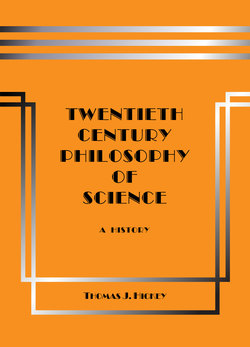Читать книгу Twentieth-Century Philosophy of Science: A History (Third Edition) - Thomas J. Hickey - Страница 84
На сайте Литреса книга снята с продажи.
4.04 More Recent Ideas
ОглавлениеMost of the twentieth-century post-positivist proposals for the aim of science are less dogmatic than those listed above and arise from examination of important developmental episodes in the history of the natural sciences. Some noteworthy examples:
Einstein: Reflection on his relativity theory influenced Albert Einstein’s concept of the aim of science, which he set forth as his “programmatic aim of all physics” stated in his “Reply to Criticisms” in Albert Einstein: Philosopher-Scientist edited by Paul A. Schilpp. The aim of science in Einstein’s view is a comprehension as complete as possible of the connections among sense impressions in their totality, and the accomplishment of this comprehension by the use of a minimum of primary concepts and relations. Einstein did not reject empiricism, but he included a coherence agenda in his aim of science. This thesis also implies a uniform ontology for physics, and Einstein found statistical quantum theory to be “incomplete” according to his aim.
Popper: Karl Popper was an early post-positivist philosopher of science and also critical of the romantics. Reflecting on Eddington’s historic 1919 test of Einstein’s relativity theory in physics he proposed in his Logic of Scientific Discovery that the aim of science is to produce tested and nonfalsified theories having greater universality and more information content than their predecessor theories addressing the same subject. His concept of the aim of science thus focuses on the growth of scientific knowledge. And in his Realism and the Aim of Science he maintains that realism explains the possibility of falsifying test outcomes in scientific criticism. The title of his Logic of Scientific Discovery notwithstanding Popper denies that discovery can be addressed by either logic or philosophy, but says instead that discovery is a proper subject for psychology. Cognitive psychologists today would agree.
Hanson: Norwood Russell Hanson reflecting on the development of quantum theory states in his Patterns of Discovery: An Inquiry into the Conceptual Foundations of Science that inquiry in research science is directed to the discovery of new patterns in data to develop new hypotheses for deductive explanation. He calls such practices “research science”, which he opposes to “completed science” or “catalogue science”, which is merely re-arranging established facts into more elegant formal axiomatic patterns. He follows Charles Peirce who called hypothesis formation “abduction”. Today mechanized discovery systems search for patterns in data.
Kuhn: Thomas S. Kuhn, reflecting on the development of the Copernican heliocentric cosmology in his The Copernican Revolution: Planetary Astronomy in the Development of Western Thought maintained in his famous Structure of Scientific Revolutions that the prevailing theory, which he called the “consensus paradigm” has institutional status. He proposed that small incremental changes extending the consensus paradigm, to which scientists seek to conform, defines the institutionalized aim of science, which he called “normal science”. On the other hand he said that scientists neither desire nor aim consciously to produce revolutionary new theories, which he called “extraordinary science.” Kuhn therefore defined scientific revolutions as institutional changes in science, which he excludes from the aim of science.
Feyerabend: Paul K. Feyerabend reflecting on the development of quantum theory in his Against Method proposed that each scientist has his own aim, and that anything institutional is a conformist impediment to the advancement of science. He said that historically successful scientists always “break the rules”, and he ridiculed Popper’s view of the aim of science calling it “ratiomania” and “law-and-order science”. Therefore Feyerabend proposes that successful science is literally “anarchical”, and borrowing a slogan from the Marxist, Leon Trotsky, he advocates “revolution in permanence”.
Readers wishing to know more about the philosophies of Popper, Kuhn, Hanson and Feyerabend are referred to BOOKs V, VI and VII below.
